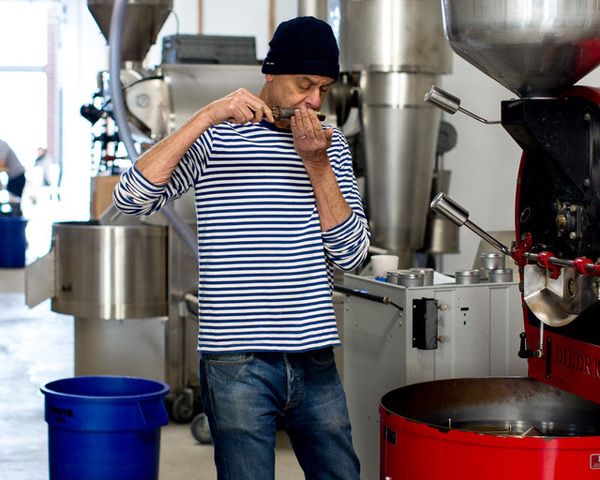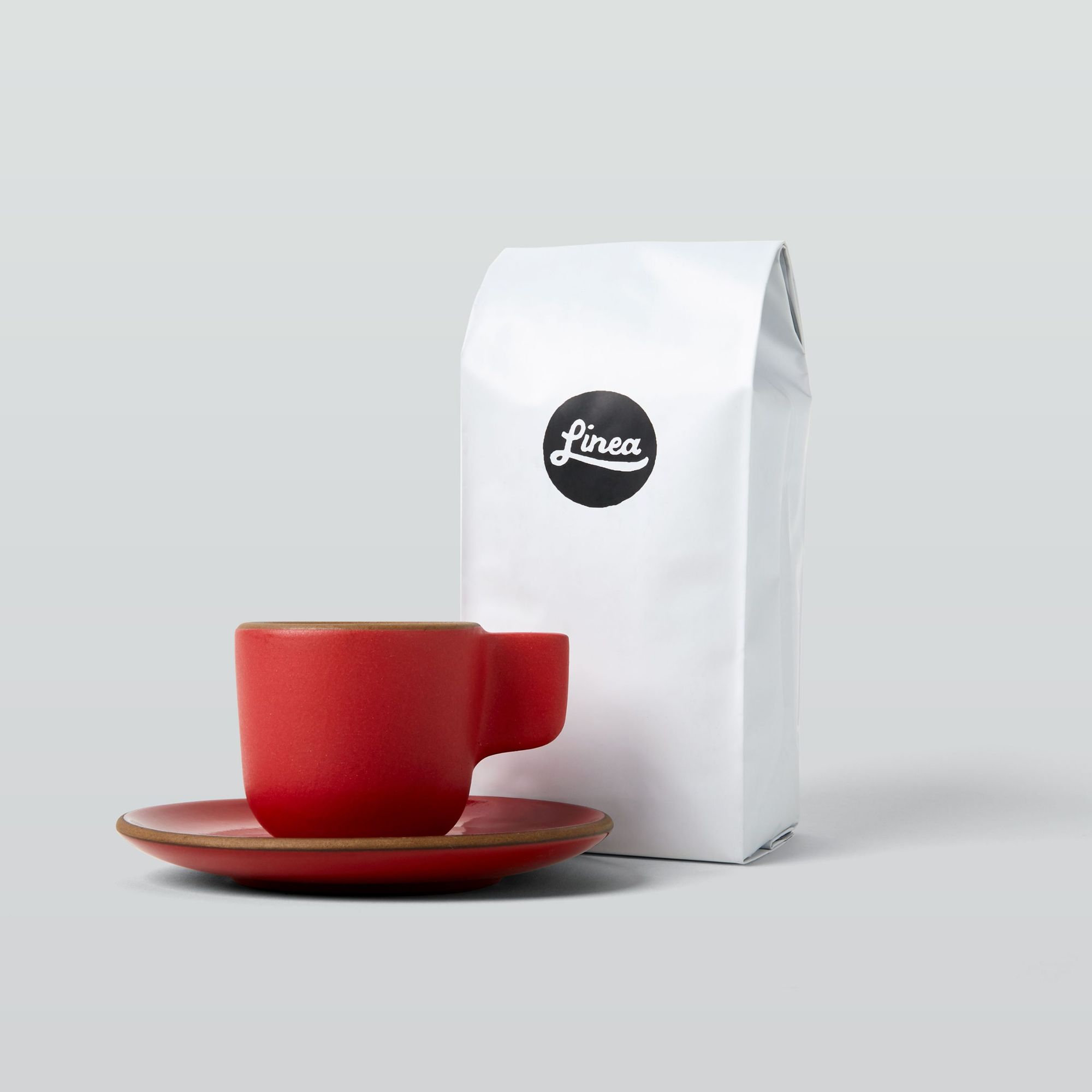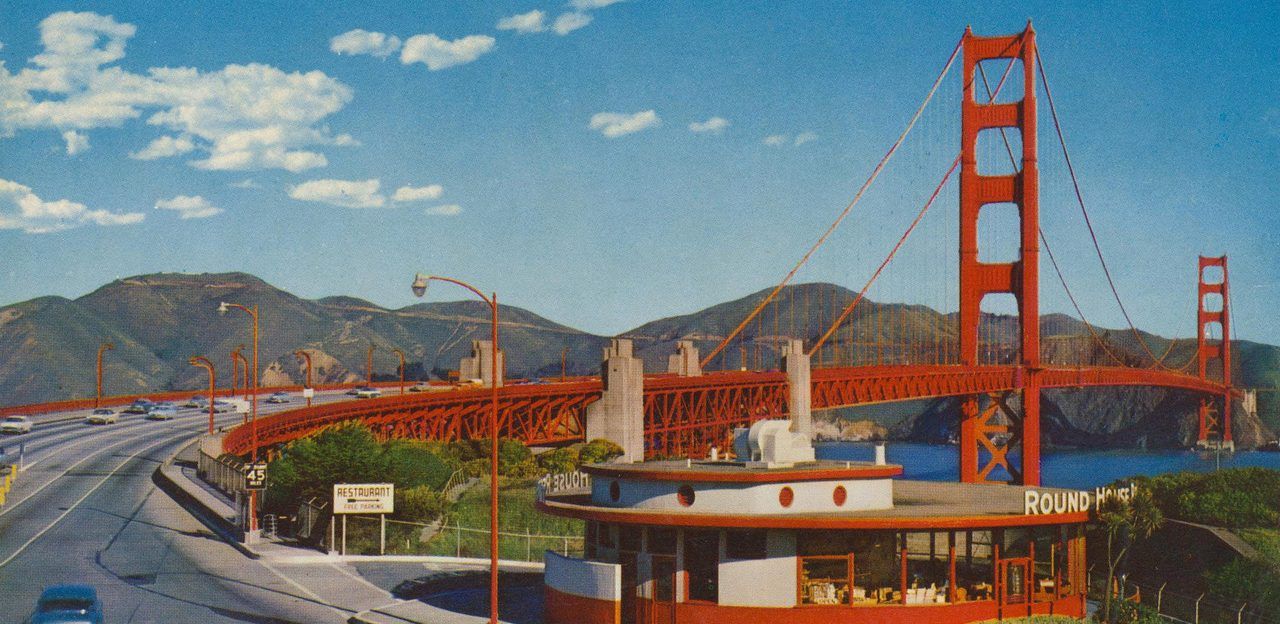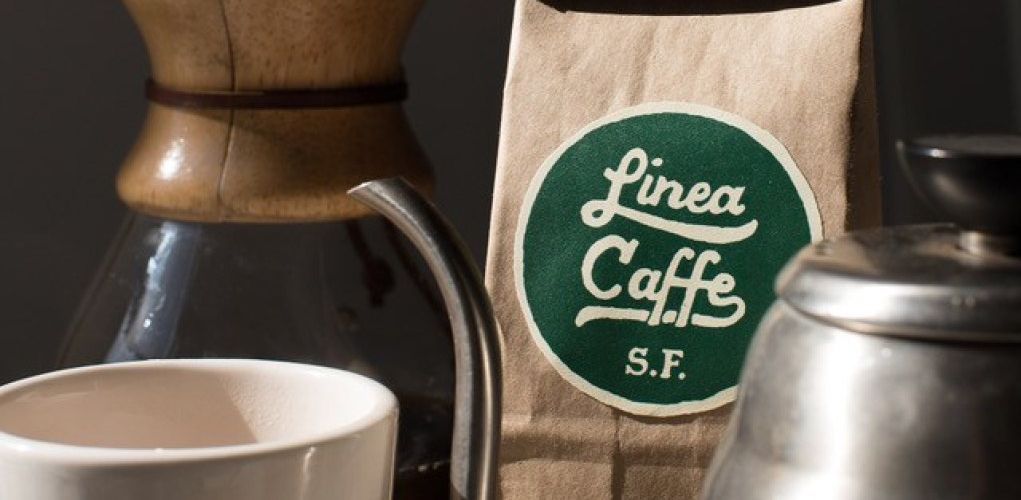Interview: Linea Caffee

Had the great pleasure of speaking with Andrew Barnett, founder of Linea Caffee this morning and learning how he’s building a great, approachable, well designed business and paralleling that in his coffee, products, staff and culture. Enjoy.
(This interview was conducted as part the premium coffee subscription program in 2020 that is no longer in operation due to COVID 19 Business Closures).
Q:
Since we’re talking about acquisitions - why don't we start the interview there. What do you think the Nestle acquisition of Blue Bottle Coffee? I mean that's really changed some of the game.
Andrew Barnett:
What do I think about it?
Q:
Yeah - I’d love your thoughts since you’ve been in the coffee world a long time.
Andrew Barnett:
You know I have a lot of talks on it. I could probably spend an afternoon talking about it. So I mean, to me, it's one is, it's an amazing amount of money. The numbers that I heard and since I didn't know for sure, other than I don't have access to Nestle's books, but I had heard that for $700 million, Nestle bought 68% of the shares in the company and some folks got very wealthy off of that.
And I think for Nestle, if it was, they were investing in a number of things. One they bought into the high end of retail, the quote unquote third wave, high end coffee retail, with that acquisition. But also, they were buying the RTD of that brand, which is Blue Bottle. Those little milk cartons with simple syrup, and chicory, and coffee, and organic clover milk and those little cans.
So for Nestle, I mean that's a very, tight small distribution. It’s in Whole Foods and some nicer boutique-ee markets - but I would imagine in 15 years, you go into like a Safeway, or you go into a Piggly Wiggly, or you go into a 7-Eleven, you will see Blue Bottle Nestle's on every retail shelf. So that's part of the play that they're investing in.
So, and they're thinking that that changes the face of things. And the same with Stumptown. You know, when they received their first investment from Wall Street firm JAB Holding Company, and now they're part of, well that was TSG, which is a Wall Street firm. Now they're, that company's owned by JAB Holding Company.
So I think for Nestle's, for Blue Bottle, probably a good deal. I think it's interesting that these companies have matured and they're going mainstream and that's similar to what's happened in a lot with a lot of the microbreweries are getting picked up by bigger players like InBev. Excuse me for talking so much.
Q:
I see the parallels to the beer world dramatically. The difference is in beer, there was a lot of acquisitions in the beer world, and now you're kind of seeing that they maybe overvalued some of them because the distribution is just really challenging and keeping, mainstreaming craft is more difficult than it seems.
Andrew Barnett:
Yeah.
Q:
I'm curious how with those acquisitions, has that affected how you're running Linea at all?
Andrew Barnett:
I mean, we seem to be under the radar. I mean what we're doing, we're pretty, probably a blip on the radar. But I think it affects us in the sense that if a company, our colleagues, our competitors, are owned by ... Nationally, so for instance, Blue Bottle, they're going to open up 30 new shops this year. Worldwide. In 2019 to 2020, and probably from 2020 to 2021 maybe 60, maybe more.
What that means is of those 30 shops, maybe six of those will be in the Bay area. But what that means to a smaller independent like us, is that Blue Bottle, Nestle, they have the resources to have full time real estate people that just look at the best deals, the best locations, the demographics, and if a good location comes up or the right location, the right iconic building, they have the money, they have the infrastructure, they have the team to execute on that. So that that gives them an advantage.
The other thing is, but they're also competing for the same talent pool of baristas, roasters, managers and they're competing with us and they have a lot of resources. Does that mean that small independents can't succeed when a Blue Bottle or a JAB Holding Company are involved? I'd say no. I'd say there's always room for creative people with great products.
It's just, there are a lot of players in there and I think at some point over the next few years we'll see more consolidation, more acquisitions, and then a lot of people that got into third wave coffee thought it's kind of fun, it's kind of sexy, but it's really hard work. They will feel squeezed out and they'll probably jump out of the business for competition reasons, and then we'll obviously get more consolidation.

Q:

I mean, talking about Linea's history, you guys, you had an acquisition in your past. Tell me more that.
Andrew Barnett:
Yeah, 10 years ago I sold my company, which was, Echo Cafe. We were a Sonoma County based, and we were all wholesale, no cafe, and a lot of the work was, we were working with, I'll call some of the world's most quality focused coffee farmers and it was, we're doing direct trade before it was even a word or a buzz word, and our business was about 85% organic.
I always felt that being up in Sonoma County was a competitive disadvantage that the real high end coffee bars were probably in the big cities like San Francisco, New York, LA, Portland, a little bit Seattle, for the US. But that's really exploded through, groceries in every city now. And at that time I didn't have the resources to move to San Francisco. I wanted to be there in San Francisco and work.
When I was in negotiation with Doug Zell from Intelligentsia and Dwayne Sorenson, the founder of Stumptown, to partner with one of their companies and we wound up going with intelligentsia since we wanted to be very much to be in San Francisco and New York. So wound up moving, selling the company, Echo to Intelligensia. I stayed with Intelligentsia for three years after as part of the deal. And that was, it was a good part of my life. I really enjoyed that period.
So, and then I moved back to San Francisco. I lived in San Francisco for six years before moving up to Sonoma County but I wanted to be more of an urban environment, for my work and for personal reasons.
Q:
When you left Intelligensia, what prompted you to start Linea?
Andrew Barnett:
Well, that's a great question. I mean, what I love doing is developing products, tasting coffee. And even before I got into coffee and my training was as a dinner chef and working in restaurants and I got into coffee, I was cooking and got a job at a cafe that had an espresso machine in San Francisco. And I was an art student, but I wanted to continue working in food. Anyhow that's that.
But at the end of my Intelligensia contract, when it was nearing the end, I thought, "Well, I really have all these friends that are coffee producers, and I like traveling to origin. I like roasting coffee, I liked developing product. I want to have a cafe. It's either going to be in New York for San Francisco." And then I thought, whether I want to do it, and I decided to open the cafe and just started another coffee roasting company and at that time I was looking for a location.
This was in 2012, and Anthony mentioned permission, Mission Chinese Food. He was the consultant for Mission Bowling Club. And he asked me to do some consulting for Mission Bowling Club and then I was looking for a location for Linea, and the spot that's Linea Caffe right now is something I think Anthony had his eyes on and as I said, Anthony was a co-owner of Mission Chinese Food. He mentioned the spot which Linea Caffe is, as he thought it would be a good location for a cafe.
And at that time he said that, was I interested in partnering? Well, we never became partners, but it wound up, when we started that project he was making the Belgium waffles and the salads in that space. But for me it was easy. I thought, "Well, I'll just stay here in San Francisco. My wife's a psychologist and that's, I'll work here."
So it kind of worked out and then I knew the guys who owned a Highwire Coffee over in Emeryville and they had a vintage Probat, and they said, "Do you want to do your roasting over here?" And I thought that sounds pretty good. You know, I don't have to do a lot of capital outlay to buy a coffee roaster and find a location, I can just go right in and start doing that and I already have the coffee farmers I know, I can just have beans delivered to Highwire Coffee and roast when we need to roast coffee.
That worked out pretty good for the first couple of years. Eventually they moved our roasting to a shared cooperative over in Oakley, The Pulley Collective, and then this year, we did a full circle. Intelligentsia moved out of the space in Potrero Hill. And I knew the president of Intelligensia and we started talking about putting together a deal and we did and there was a large space. It's 5,000 square feet and it had a little vintage Probat roaster and that's worked out. We bought all the Intelligentsia assets in the building and we moved in June.
Q:
Yeah. How is that location working for you? You seem to like it.
Andrew Barnett:
It's great. I mean, it's the space to grow. I mean it's 17 times the size of our little mission district cafe. So it's got a beautiful vintage roaster. It's got a lot of beautiful light. It's fabulous. So it's unique finding anything in San Francisco that's a big building that's affordable. One story that hasn't been leveled for big multi-use condo, it's like finding a needle in a haystack. But we found it and it's working out really well.
So it feels like most people in the Bay area moving out of San Francisco and they're going out to Oakland or Albany, or somewhere further out in order to be quote on quote more affordable. And we kind of did the opposite. We moved from the East Bay into San Francisco, but we've got a really great crew share and the vibe's great. Right now we're raising what little bit of money to finish up opening a cafe. I think we'll have the cafe part open, I'd say probably beginning of the year. Well it is the beginning of the year. I'd say by spring of 2020 we should have that up and running. But that'll be our second cafe.
Q:
Andrew, you gave me a lot of nostalgia, Mission Chinese and that kind of vibe of the Mission. I think with the tech boom, it's made it a lot harder for small entrepreneurs. I'm just curious how you see your role in that kind of history because even mission Chinese has expanded but the rest of the Mission has kind of, I don't know, I'm just curious what your thoughts on the general retail scene as in-
Andrew Barnett:
Yeah some parts. I mean in some ways it's, for us it's funny because our biggest wholesale account is Google. We sell more coffee to Google than anyone else. So we benefit from the tech explosion and I'd say a high percentage of our guests at our cafe work in the tech industry or they have a member of their family that's in tech.
So we just, our focus has always been on serving great coffee and creating joyous experiences for our guests. I happen to be a coffee geek, so I care very much about the flavor and could probably clear a room talking about coffee geeky type of things. But really I just want to make people happy and create good vibe, create pretty spaces, nice tasting coffee, friendly exchanges with our staff and I'll guess, wholesale partners.
But we've, I think from tech standpoint, the Mission's, first off, San Francisco's always been changing, I mean probably since the Spaniards set up the mission and the Ohlone Indians kind of were displaced, and then there was the gold rush, and it's a city of constant change and the Mission very much so. Right now it's a Mission, kind of a mishmash of this great affluence, and then people who just really struggling and are barely getting by, and when the homelessness, and drug addiction, and poverty, and mental illness, and sometimes all of the above, and then great wealth and kind of also great innovation.
So it's a strange place to live in some ways. It's a very vibrant place. It's a little different than other parts of the city because age group tends to be more around about thirty ish. But our guests are great. I love being in the Mission and consider myself fortunate.
Q:
So you know, your friendly tone and atmosphere I think is very palatable across the cafe and everything to the coffee itself. I'd love to know how you approach kind of your blending and roasting to kind of meet that-
Andrew Barnett:
Yeah, I think that that's an interesting thing. I think, and that's my challenge, the cliche. But I think my goal is to create coffees that are approachable, as much as like people say, "What the fuck is that?" But I think in terms of coffee, I think that, well one is, I think that coffee, that flavors unify people, that people like certain flavors. And I think that, people, humans like sweet things and even children like sweet things and you don't need to be a coffee expert too, like good coffee.
And that's a sweet coffee and people sometimes go, "Andrew, you're so lucky, you're a coffee expert. I can never be like that. I can't, how do you taste these flavors?" And I go, "You don't need to be a coffee expert to enjoy good tasting things." and I think about, like peaches.

If you take care like a little child and you cut a slice of a peach that was just picked off of a tree and it's delicious, and it's ripened, and sweet, and has all this flavor and then you take another peach that was maybe picked a couple of weeks before it was ripened and then put into cold storage, and went to a Safeway, and took a slice of that and you ask the child which peach tastes better? Probably the kid's going to pick that peach that was right off the tree that had a chance to ripen and develop the sugars and the same is true for good coffees, that sorting and selecting them.
I think people, guess they respond to sweet flavors. If that's something that's universal and that, my approach to a espresso, is it's not as bright as ... We do have brightness in our espresso. We use some Ethiopian coffees, but they're really sweet. We use a lot of Brazil coffee that have a lot of body, and chocolate, and caramel, and vanilla notes, and people seem to like those.
Also a lot of our guests at our cafes say they'll drink straight shots of espresso, but most of our guests are pairing their espresso with milk, or having a cappuccino, or a latte or cortado. So we're always thinking about things that parallel with milk, or alt-milks like oat milk or almond milk.
But for me, I've always wanted for coffee to be approachable and it's diverse. I mean, we buy our coffees from Brazil, but we've got coffees from Ethiopia, from Guatemala, from Honduras, from, a lot of coffees from Peru, coffees from Mexico, some Colombia.
One of the things too is, I mean our company, I think we're known more for our espresso. And if you go into our cafe, 70% of our sales are espresso. It seems to be a little bit on the higher side. But we also really enjoy doing a lot of the single origins. And this is, we haven't able to announce yet, but our Guatemala coffee from Finca El Injerto is a winner this year for good food awards. So that's one of our single origin filter coffees.
So, but my focus has always been on sweet, approachable coffees. And I think of Linea in some ways. Kind of like maybe like the underground band or the indie band that hasn't quite fit in the pop door mainstream yet. Like a Blue Bottle or how would I say it, a Stumptown or some of the other players. But kind of like, I think we'll be one that people care about a lot more over the next five years. And they'll go, "Yeah, I followed the band. I liked that band back in the day." So, and people say a lot more about it. So especially with the new Potrero Hill location.
Q:
So just a final question about sourcing. Are you still direct sourcing? Are you using brokers or I'm curious to know about the beans.
Andrew Barnett:
That's a great question. So 80%, 75% of the coffee, we buy are from Brazil and we buy from a farm called Fazenda Ambiental Fortaleza, which in Portuguese means that when the farm ambient or atmosphere orderly, there's a fortress, so fort. So it's for, farm to protect the atmosphere, the environment.
So we, we get most of our coffee from FAF. That's coffee going to Google and a lot of our espresso blends and they're all very high specially coffee, like high scoring. Then the ones that are the best ones we put into our espresso for the cafes and we sell as micro hops on the internet. That's probably what we're selling through Kaldi.
So, but that's 75%. 5% of what we get is from Guatemala. From Finca El Injerto and Esperanza. So those are coffee by source. Also through longstanding friendships with coffee growers in Guatemala. Then the other 15 to 20% are places I don't go so much because I only have so many days out of the year.
That would be our coffees from Peru. Those I get from either Red Fox Coffee, that's Aleco Chigounis who was the green coffee buyer for some town, and now as a company and it's from Berkeley. And we did get our coffees through Aleco, and I've known Aleco for 15 years, and I know that he works with great farms and that he pays his farmers well. He's really an ethical, by the book, type of individual.
The other place we get a lot of coffees from, probably the other 10-15% is from Trabocca Coffee, and that Trabocca, they're based out of Amsterdam. They've been bringing in coffees into the US for the last 16-17 years. And their specialty is Ethiopian, and the owner's former attorney, who became a, kind of a trader in commodities, and his company was getting subsidies from the Dutch government to invest into Ethiopian coffee mills and coffee farms, specifically organic and fair trade. And they would invest in their infrastructure and bring those coffees to market.
We started buying those copies when I owned Echo, Probably 2004. So I've been buying from Trabocca now for 16 years, and their coffees are great. So they were selling coffees to Counter Culture, to George Howell to Intelligensia, to Stumptown. We knew the leaders and they're still doing it. So even though I don't get to Ethiopia, I haven't been there for several years. We stood by our Ethiopian coffees through Trabocca mostly, yeah.
Q:
Nice. So, I mean with the expansion now what's your goals for the next five years? Keep the indie band just approachable and familiar or what are you really trying to do?
Andrew Barnett:
So I think first is, you know there's first is, well are we creating joy, are we creating better jobs for the people that work here? Because really is, before we can even talk about expansion, you have to have culture, you have to have people that really love their work that really are equally passionate.
As, I'm the guy who owns a company but I can't do it all, and I think that's part of it is how do you retain good people that stay in the company, invest in those people, invest in the culture and then they're kind of is people become the ambassadors for the brand, and spreading the word and they're the advantage. That's really key, is keeping those people around. So if we have opportunities to go to other places in the Bay area, or other parts of the country. We've got a really great team in place and we're developing the culture.
The other thing to me, I'm always concerned about having great coffees. But I'm also more concerned than ever about the environment, about creating zero food print. That we're recycling, we're composting, we're working with farms that are doing good things for the environment, for helping work on climate control, and there, even on small levels and they're looking at different ways as a brand that we can be a good citizen because I think I care about that. But I think that most consumers care about that. They want to find out ways they're doing good things with the world with their products. So that's just one of my other passions.
Yeah, and I think that I think they're going to be more opportunities for us. You know, I'm funny, I kind of, I don't like to hype myself too much. I'm probably, I've been guilty of underselling my company at times. I need to promote it because that's what you do when you own a business, is you want it to survive and you want it to, not just survive but thrive. Not just to make money, but to create more opportunity for the people that support the company and create better experiences for the guests.
Q:
Awesome. Is there anything else that you want to add?
Andrew Barnett:
I think that's it. I mean, I hope people taste our coffees. I hope they enjoy them as much as we do. We're excited about sharing them.
Find and review Linea coffees anytime in San Francisco, at their cafe on 18th street.